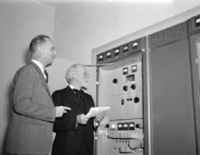
William Lighty was a professor in the Speech department and the first program manager of WHA, beginning in 1921. Along with Earle M. Terry, Lighty was a primary influence on the philosophical model of WHA as a university extension and adult education medium.
Lighty joined UW staff in 1906 to work at the extension division under University President Charles Van Hise, and later became interested in radio because his sons were wireless enthusiasts. The School of the Air was instituted in 1931; in 1933 Lighty helped to establish the College of the Air, and oversaw the adult education and distance learning extension services division of WHA. As Director of Extension Teaching, Lighty set up correspondence study courses, coordinated teacher travel, and organized public events to promote educational radio programs that were often mixed with entertainment.
He is further described in archive correspondence as an eccentric and anachronistic personality. One letter details Lighty as presenting himself with a ‘neatly trimmed goatee, flowing Windsor tie, and twinkling eyes.’ Harold McCarty later reminisced that for years Lighty rode horseback to campus from his home in the Highlands, west of town. When finally convinced to drive, he purchased an early Franklin air-cooled automobile that he commuted to use long after other cars of that make had disappeared.
Lighty had a profound influence on the station’s public service model, writing only a year after Britain instituted its public service broadcasting model, the British Broadcasting Corporation, that radio should commit to education, public uplift, and public service. This notion was influenced at least in part by Van Hise’s “Wisconsin Idea,” which viewed the university as a public institution that should serve the entire constituency of the state. When the faculty and staff at WHA realized the power and possibility of radio, the medium naturally appeared as an opportunity to realize the university’s maxim. Lighty wrote heavily on the topic, arguing that radio should provide educational opportunities for all citizens, from industrially and socially congested centers to rural communities eager to share in the benefits of knowledge.
Radio should further function, he wrote, as a primary socializing agent that would aid in the ‘rationalizing’ of all citizens. Residence teaching, he posited, aimed to rationalize the world through the regiment of teaching and training the youth, whereas extension services addressed the instruction of adults. “Its great task is the development of the great area of adult education, and to develop it as a public undertaking. The vast future development of extension teaching lies in the field of instruction and leadership of adult life and its results in a fairer, happier civilization. Extension must teach, by formal or informal methods, the men and women who are already moving in the currents of life, meeting and attempting to solve the problems they face” (Lighty, Conference Paper written for the 8th Annual Convention of the National University Extension Association in St. Louis, 1923).
Lighty generously donated his entire saved corpus of personal and business documents related to his work at WHA. His archives feature nearly one hundred boxes of radio recordings, letters, statistical reports, and radio promotions.
